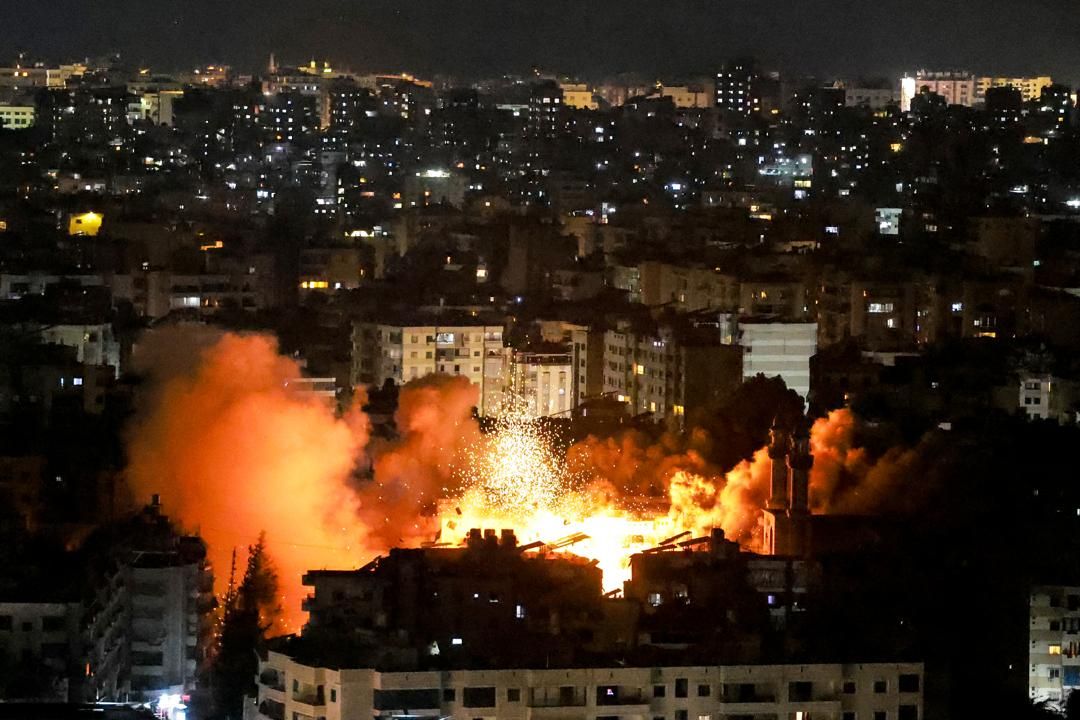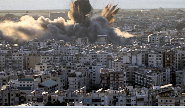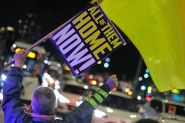- Home
- War in the Middle East
- Major Israeli Airstrikes Target Hezbollah Drone Facilities in Beirut’s Southern Suburb; Katz warns no calm without disarmament

©IBRAHIM AMRO / AFP
On the eve of Eid al-Adha, the Israeli army launched a significant military escalation by conducting multiple airstrikes on the southern suburbs of Beirut. The bombardments targeted the districts of Hadath, Haret Hreik, and Bourj el-Barajneh, following Israeli orders to evacuate several buildings. Israel claims it targeted infrastructure used by Hezbollah for drone manufacturing, triggering widespread panic and a mass exodus of residents.
Intensive Drone Surveillance and Evacuations Amid Panic
According to the Lebanese National News Agency (ANI), Israeli reconnaissance drones extensively patrolled the skies over the southern suburbs hours after Tel Aviv threatened to strike certain residential buildings. Evacuation orders applied to five specific buildings and surrounding structures, with instructions to keep at least 300 meters away from the designated targets.
In the targeted areas, heavy gunfire accompanied the evacuations, creating chaotic scenes across several streets. Major traffic jams paralyzed movement, particularly around Haret Hreik and Bourj el-Barajneh.
Initial Strikes Hit Haret Hreik
The first airstrikes struck the Haret Hreik neighborhood, a Hezbollah stronghold. Israeli army spokesperson Avichay Adraee stated the targets were underground facilities belonging to Hezbollah’s "Air Unit 127," specialized in drone production and deployment.
Residents of Bourj el-Barajneh described violent tremors following the explosions.
Warning Issued in Southern Lebanon and Israeli Military on High Alert
Simultaneously, the Israeli army issued a similar evacuation warning to residents of the village of Ain Qana in the Nabatiyeh district, urging immediate departure. Israeli media described the operation as the largest against Hezbollah since the ceasefire. Additionally, Israel’s missile defense systems were placed on maximum alert in the country’s north, anticipating possible retaliation.
Israel Justifies Strikes, Accuses Hezbollah
The Israeli military said the strikes aimed to neutralize underground installations used for drone manufacturing. Hezbollah’s "Unit 127" is accused of producing thousands of drones under Iranian supervision and financing. This activity allegedly violates tacit agreements between Israel and Lebanon and prepares for a potential future conflict.
Israeli Defense Minister Threatens Lebanon
Israeli Defense Minister Israel Katz warned Friday that Israel will keep striking Lebanon until it disarms Hezbollah.
"There will be no calm in Beirut, and no order or stability in Lebanon, without security for the State of Israel. Agreements must be honoured and if you do not do what is required, we will continue to act, and with great force," Katz said in a statement.
Katz said he was responding directly to condemnation by Lebanese President Joseph Aoun of Thursday evening strikes on south Beirut. Aoun called the strikes a "flagrant violation" of the November ceasefire
Beirut Airport Operations Continue
Despite the intensity of the strikes, Amine Jaber, Director General of Lebanese Civil Aviation, confirmed that Beirut International Airport was operating normally. He noted measures were taken to prioritize use of the coastal runway, ensuring continuity of air traffic.
Lebanese Official Reactions: Strong Condemnations
President Joseph Aoun vehemently condemned the Israeli strikes, calling them a "blatant violation of international law and UN resolutions," while denouncing a "cynical provocation directed at the United States, at the cost of innocent civilian blood." He vowed that Lebanon "will never yield to this bloody blackmail."
Prime Minister Nawaf Salam also denounced the "systematic aggression" against Lebanon, its sovereignty, and economy on the eve of religious holidays and the start of the tourist season. He urged the international community to pressure Israel to end its violations and implement UN Resolution 1701, including demanding a full Israeli military withdrawal from Lebanese territory.
Minister of Foreign Affairs Youssef Raji conveyed Lebanon’s condemnation of the Israeli attacks on Beirut’s southern suburbs and the Ain Qana area in the south. He also reiterated the need to implement UN Security Council Resolution 1701 and for Israel to respect the ceasefire agreement.
Iran slams Israel 'aggression' against Lebanon
Iran condemned Israeli "aggression" against Lebanon on Friday after its arch foe carried out air strikes against Tehran-backed militant group Hezbollah in south Beirut.
Foreign ministry spokesman Esmaeil Baqaei described the Thursday evening strikes "as a blatant act of aggression against Lebanon's territorial integrity and sovereignty."
Read more



Comments